Psychoanalytic and Behaviorist Theories: A Comparison
VerifiedAdded on 2020/01/23
|8
|2675
|125
Essay
AI Summary
This assignment provides a comprehensive comparison of psychoanalytic and behaviorist theories, delving into their core principles, key differences, and applications. The essay explores the assumptions underlying each perspective, examining how proponents of each school might view environmental stimuli and concepts like the id. It then evaluates the strengths and weaknesses of both positions, including the use of observational methods in natural and artificial settings, with reference to studies like Piliavin et al. (1969). The assignment concludes with an analysis of Zimbardo's prison study, discussing its implications for understanding human behavior in controlled environments. The document offers a detailed examination of these psychological concepts, supported by relevant research and analysis.
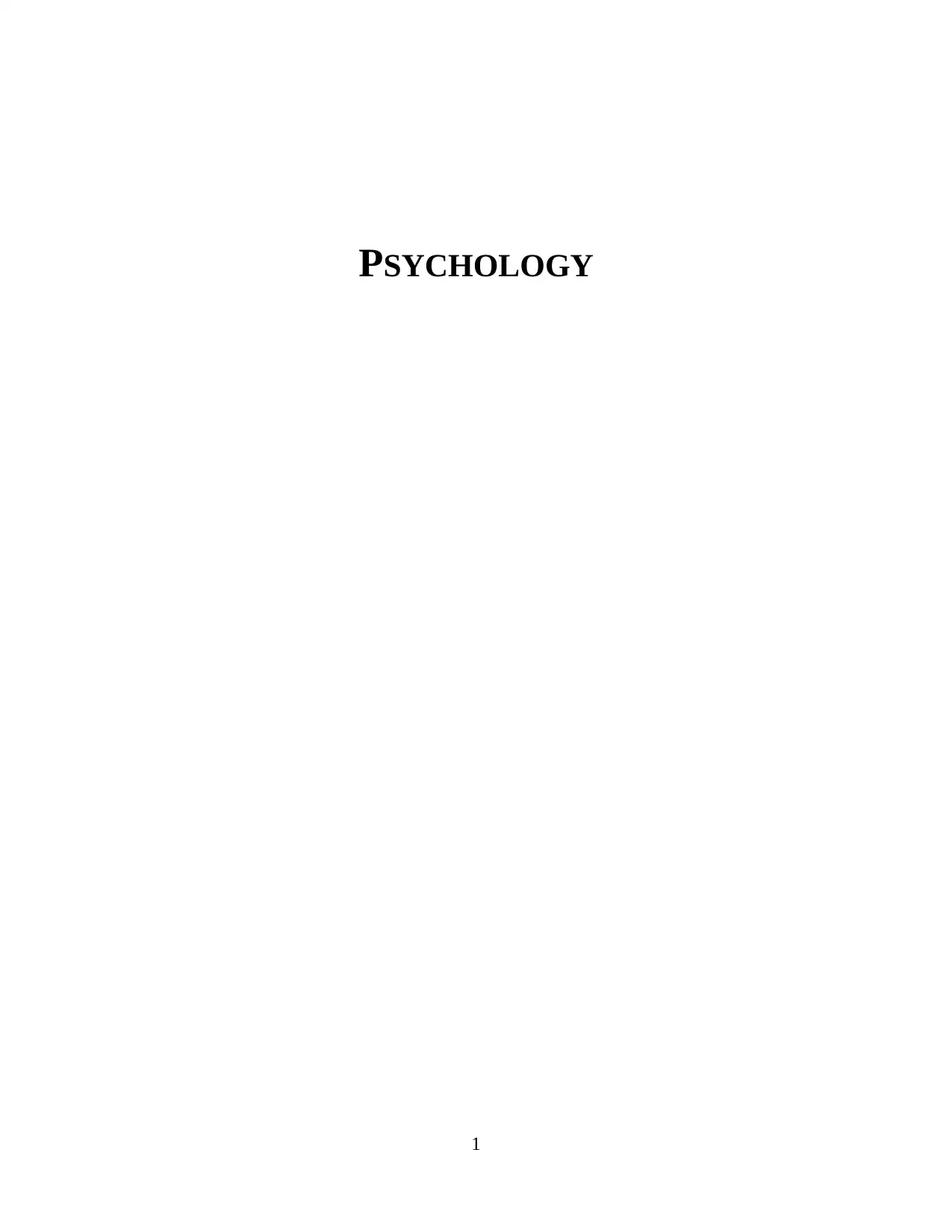
PSYCHOLOGY
1
1
Paraphrase This Document
Need a fresh take? Get an instant paraphrase of this document with our AI Paraphraser
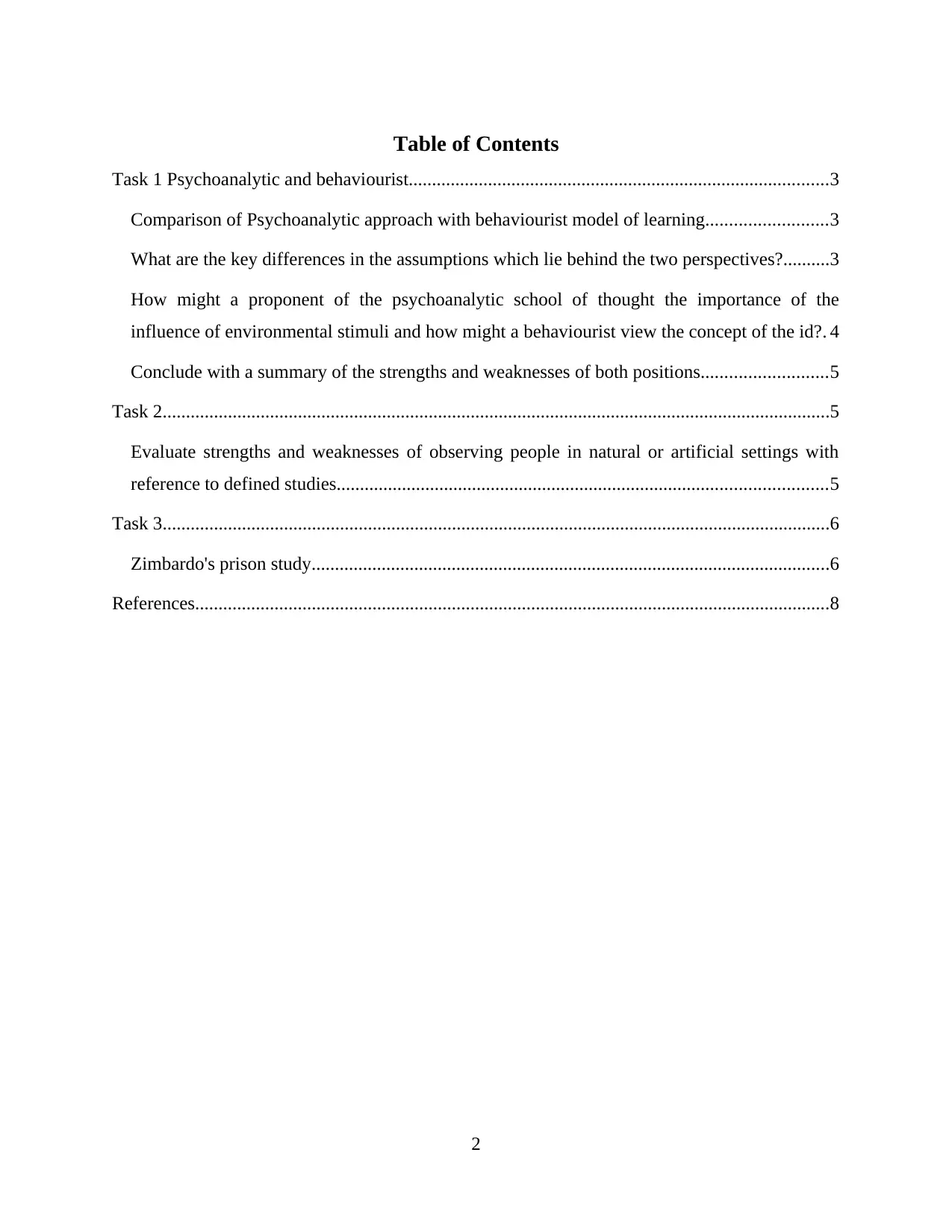
Table of Contents
Task 1 Psychoanalytic and behaviourist..........................................................................................3
Comparison of Psychoanalytic approach with behaviourist model of learning..........................3
What are the key differences in the assumptions which lie behind the two perspectives?..........3
How might a proponent of the psychoanalytic school of thought the importance of the
influence of environmental stimuli and how might a behaviourist view the concept of the id?. 4
Conclude with a summary of the strengths and weaknesses of both positions...........................5
Task 2...............................................................................................................................................5
Evaluate strengths and weaknesses of observing people in natural or artificial settings with
reference to defined studies.........................................................................................................5
Task 3...............................................................................................................................................6
Zimbardo's prison study...............................................................................................................6
References........................................................................................................................................8
2
Task 1 Psychoanalytic and behaviourist..........................................................................................3
Comparison of Psychoanalytic approach with behaviourist model of learning..........................3
What are the key differences in the assumptions which lie behind the two perspectives?..........3
How might a proponent of the psychoanalytic school of thought the importance of the
influence of environmental stimuli and how might a behaviourist view the concept of the id?. 4
Conclude with a summary of the strengths and weaknesses of both positions...........................5
Task 2...............................................................................................................................................5
Evaluate strengths and weaknesses of observing people in natural or artificial settings with
reference to defined studies.........................................................................................................5
Task 3...............................................................................................................................................6
Zimbardo's prison study...............................................................................................................6
References........................................................................................................................................8
2
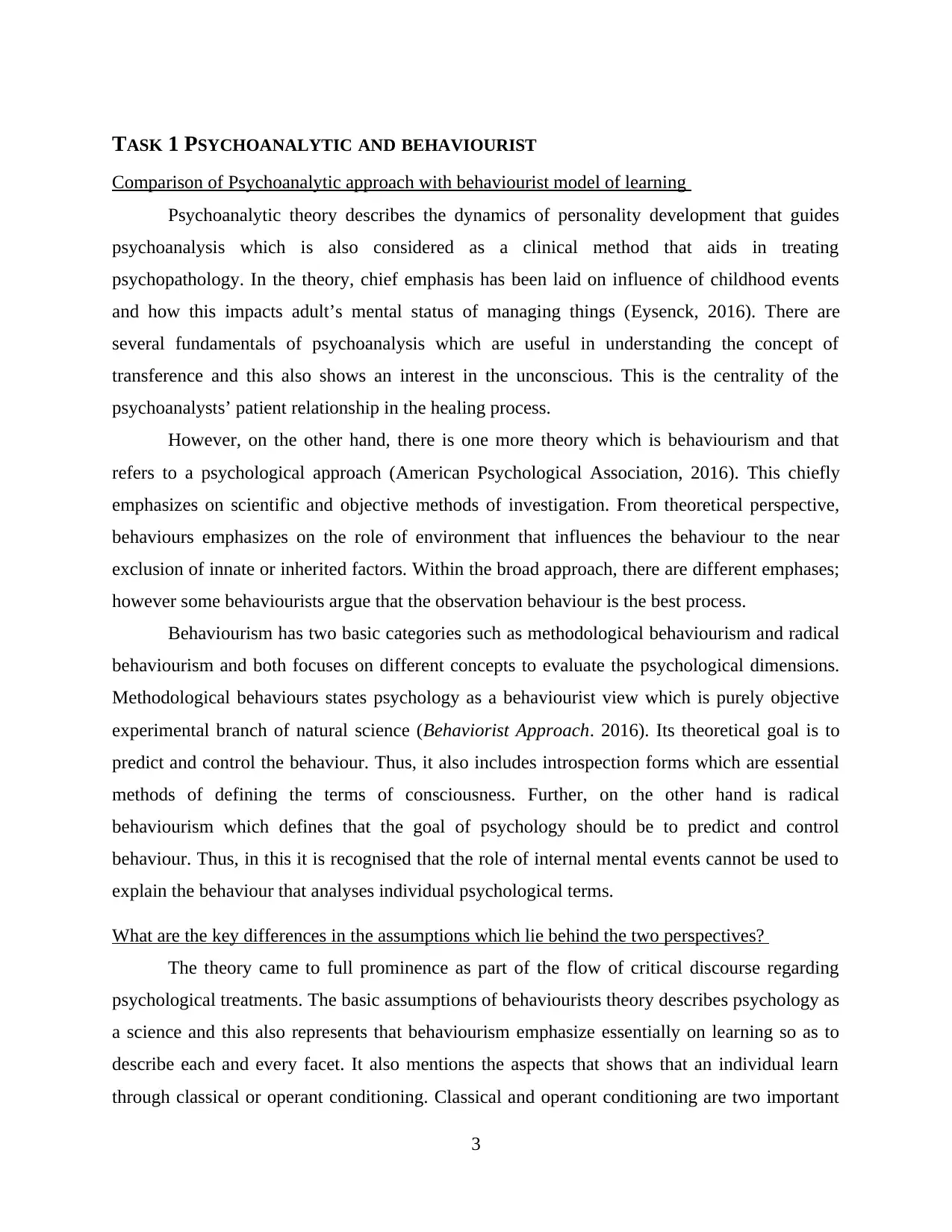
TASK 1 PSYCHOANALYTIC AND BEHAVIOURIST
Comparison of Psychoanalytic approach with behaviourist model of learning
Psychoanalytic theory describes the dynamics of personality development that guides
psychoanalysis which is also considered as a clinical method that aids in treating
psychopathology. In the theory, chief emphasis has been laid on influence of childhood events
and how this impacts adult’s mental status of managing things (Eysenck, 2016). There are
several fundamentals of psychoanalysis which are useful in understanding the concept of
transference and this also shows an interest in the unconscious. This is the centrality of the
psychoanalysts’ patient relationship in the healing process.
However, on the other hand, there is one more theory which is behaviourism and that
refers to a psychological approach (American Psychological Association, 2016). This chiefly
emphasizes on scientific and objective methods of investigation. From theoretical perspective,
behaviours emphasizes on the role of environment that influences the behaviour to the near
exclusion of innate or inherited factors. Within the broad approach, there are different emphases;
however some behaviourists argue that the observation behaviour is the best process.
Behaviourism has two basic categories such as methodological behaviourism and radical
behaviourism and both focuses on different concepts to evaluate the psychological dimensions.
Methodological behaviours states psychology as a behaviourist view which is purely objective
experimental branch of natural science (Behaviorist Approach. 2016). Its theoretical goal is to
predict and control the behaviour. Thus, it also includes introspection forms which are essential
methods of defining the terms of consciousness. Further, on the other hand is radical
behaviourism which defines that the goal of psychology should be to predict and control
behaviour. Thus, in this it is recognised that the role of internal mental events cannot be used to
explain the behaviour that analyses individual psychological terms.
What are the key differences in the assumptions which lie behind the two perspectives?
The theory came to full prominence as part of the flow of critical discourse regarding
psychological treatments. The basic assumptions of behaviourists theory describes psychology as
a science and this also represents that behaviourism emphasize essentially on learning so as to
describe each and every facet. It also mentions the aspects that shows that an individual learn
through classical or operant conditioning. Classical and operant conditioning are two important
3
Comparison of Psychoanalytic approach with behaviourist model of learning
Psychoanalytic theory describes the dynamics of personality development that guides
psychoanalysis which is also considered as a clinical method that aids in treating
psychopathology. In the theory, chief emphasis has been laid on influence of childhood events
and how this impacts adult’s mental status of managing things (Eysenck, 2016). There are
several fundamentals of psychoanalysis which are useful in understanding the concept of
transference and this also shows an interest in the unconscious. This is the centrality of the
psychoanalysts’ patient relationship in the healing process.
However, on the other hand, there is one more theory which is behaviourism and that
refers to a psychological approach (American Psychological Association, 2016). This chiefly
emphasizes on scientific and objective methods of investigation. From theoretical perspective,
behaviours emphasizes on the role of environment that influences the behaviour to the near
exclusion of innate or inherited factors. Within the broad approach, there are different emphases;
however some behaviourists argue that the observation behaviour is the best process.
Behaviourism has two basic categories such as methodological behaviourism and radical
behaviourism and both focuses on different concepts to evaluate the psychological dimensions.
Methodological behaviours states psychology as a behaviourist view which is purely objective
experimental branch of natural science (Behaviorist Approach. 2016). Its theoretical goal is to
predict and control the behaviour. Thus, it also includes introspection forms which are essential
methods of defining the terms of consciousness. Further, on the other hand is radical
behaviourism which defines that the goal of psychology should be to predict and control
behaviour. Thus, in this it is recognised that the role of internal mental events cannot be used to
explain the behaviour that analyses individual psychological terms.
What are the key differences in the assumptions which lie behind the two perspectives?
The theory came to full prominence as part of the flow of critical discourse regarding
psychological treatments. The basic assumptions of behaviourists theory describes psychology as
a science and this also represents that behaviourism emphasize essentially on learning so as to
describe each and every facet. It also mentions the aspects that shows that an individual learn
through classical or operant conditioning. Classical and operant conditioning are two important
3
⊘ This is a preview!⊘
Do you want full access?
Subscribe today to unlock all pages.

Trusted by 1+ million students worldwide
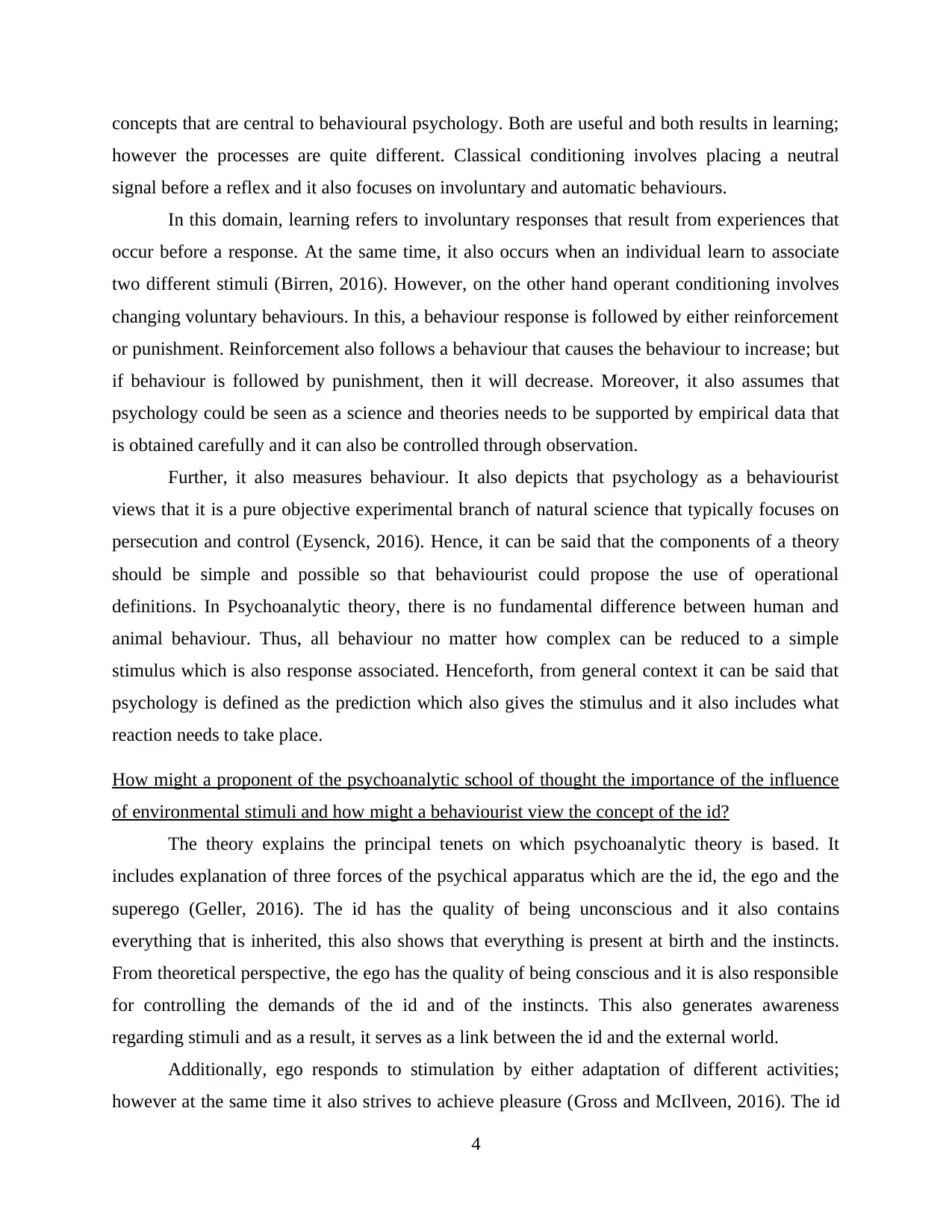
concepts that are central to behavioural psychology. Both are useful and both results in learning;
however the processes are quite different. Classical conditioning involves placing a neutral
signal before a reflex and it also focuses on involuntary and automatic behaviours.
In this domain, learning refers to involuntary responses that result from experiences that
occur before a response. At the same time, it also occurs when an individual learn to associate
two different stimuli (Birren, 2016). However, on the other hand operant conditioning involves
changing voluntary behaviours. In this, a behaviour response is followed by either reinforcement
or punishment. Reinforcement also follows a behaviour that causes the behaviour to increase; but
if behaviour is followed by punishment, then it will decrease. Moreover, it also assumes that
psychology could be seen as a science and theories needs to be supported by empirical data that
is obtained carefully and it can also be controlled through observation.
Further, it also measures behaviour. It also depicts that psychology as a behaviourist
views that it is a pure objective experimental branch of natural science that typically focuses on
persecution and control (Eysenck, 2016). Hence, it can be said that the components of a theory
should be simple and possible so that behaviourist could propose the use of operational
definitions. In Psychoanalytic theory, there is no fundamental difference between human and
animal behaviour. Thus, all behaviour no matter how complex can be reduced to a simple
stimulus which is also response associated. Henceforth, from general context it can be said that
psychology is defined as the prediction which also gives the stimulus and it also includes what
reaction needs to take place.
How might a proponent of the psychoanalytic school of thought the importance of the influence
of environmental stimuli and how might a behaviourist view the concept of the id?
The theory explains the principal tenets on which psychoanalytic theory is based. It
includes explanation of three forces of the psychical apparatus which are the id, the ego and the
superego (Geller, 2016). The id has the quality of being unconscious and it also contains
everything that is inherited, this also shows that everything is present at birth and the instincts.
From theoretical perspective, the ego has the quality of being conscious and it is also responsible
for controlling the demands of the id and of the instincts. This also generates awareness
regarding stimuli and as a result, it serves as a link between the id and the external world.
Additionally, ego responds to stimulation by either adaptation of different activities;
however at the same time it also strives to achieve pleasure (Gross and McIlveen, 2016). The id
4
however the processes are quite different. Classical conditioning involves placing a neutral
signal before a reflex and it also focuses on involuntary and automatic behaviours.
In this domain, learning refers to involuntary responses that result from experiences that
occur before a response. At the same time, it also occurs when an individual learn to associate
two different stimuli (Birren, 2016). However, on the other hand operant conditioning involves
changing voluntary behaviours. In this, a behaviour response is followed by either reinforcement
or punishment. Reinforcement also follows a behaviour that causes the behaviour to increase; but
if behaviour is followed by punishment, then it will decrease. Moreover, it also assumes that
psychology could be seen as a science and theories needs to be supported by empirical data that
is obtained carefully and it can also be controlled through observation.
Further, it also measures behaviour. It also depicts that psychology as a behaviourist
views that it is a pure objective experimental branch of natural science that typically focuses on
persecution and control (Eysenck, 2016). Hence, it can be said that the components of a theory
should be simple and possible so that behaviourist could propose the use of operational
definitions. In Psychoanalytic theory, there is no fundamental difference between human and
animal behaviour. Thus, all behaviour no matter how complex can be reduced to a simple
stimulus which is also response associated. Henceforth, from general context it can be said that
psychology is defined as the prediction which also gives the stimulus and it also includes what
reaction needs to take place.
How might a proponent of the psychoanalytic school of thought the importance of the influence
of environmental stimuli and how might a behaviourist view the concept of the id?
The theory explains the principal tenets on which psychoanalytic theory is based. It
includes explanation of three forces of the psychical apparatus which are the id, the ego and the
superego (Geller, 2016). The id has the quality of being unconscious and it also contains
everything that is inherited, this also shows that everything is present at birth and the instincts.
From theoretical perspective, the ego has the quality of being conscious and it is also responsible
for controlling the demands of the id and of the instincts. This also generates awareness
regarding stimuli and as a result, it serves as a link between the id and the external world.
Additionally, ego responds to stimulation by either adaptation of different activities;
however at the same time it also strives to achieve pleasure (Gross and McIlveen, 2016). The id
4
Paraphrase This Document
Need a fresh take? Get an instant paraphrase of this document with our AI Paraphraser
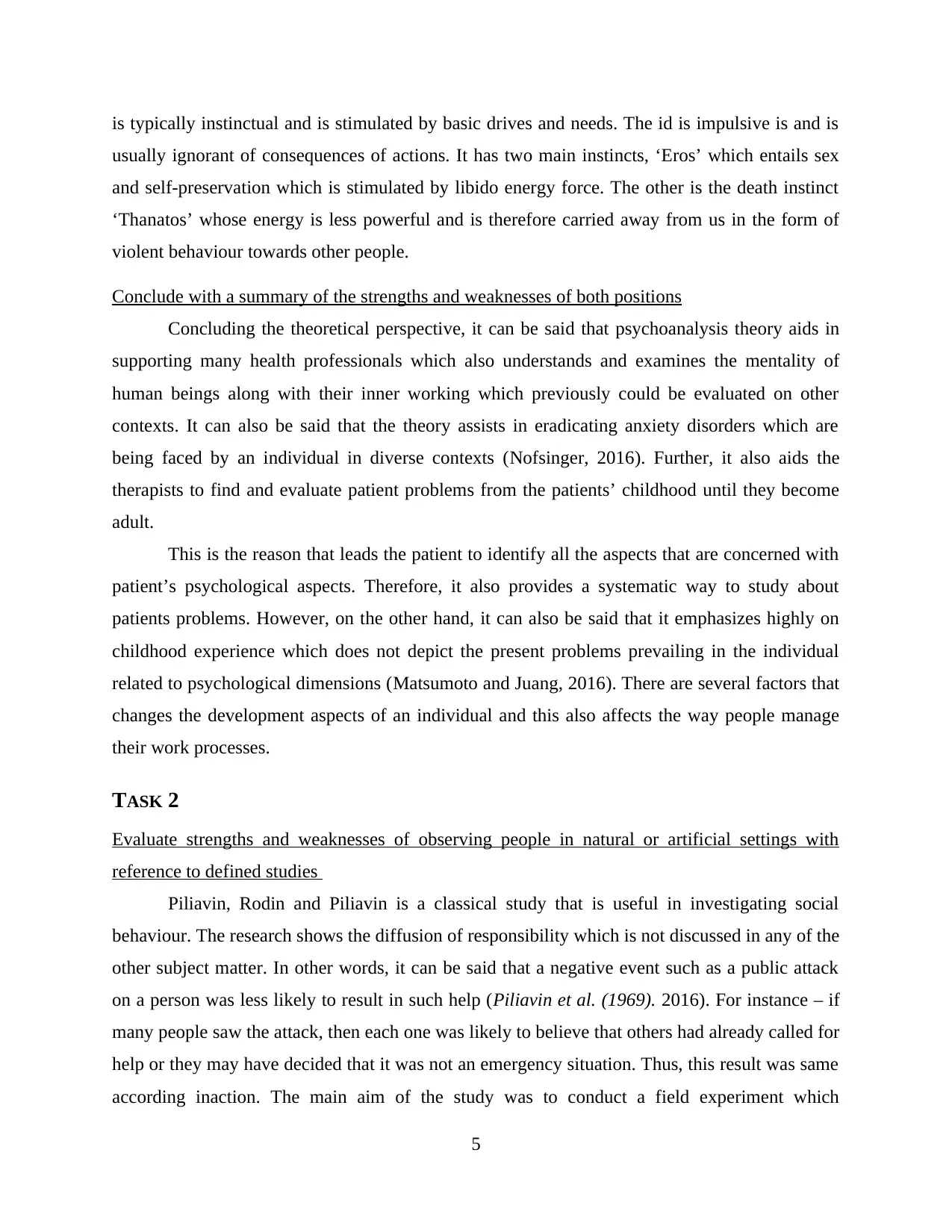
is typically instinctual and is stimulated by basic drives and needs. The id is impulsive is and is
usually ignorant of consequences of actions. It has two main instincts, ‘Eros’ which entails sex
and self-preservation which is stimulated by libido energy force. The other is the death instinct
‘Thanatos’ whose energy is less powerful and is therefore carried away from us in the form of
violent behaviour towards other people.
Conclude with a summary of the strengths and weaknesses of both positions
Concluding the theoretical perspective, it can be said that psychoanalysis theory aids in
supporting many health professionals which also understands and examines the mentality of
human beings along with their inner working which previously could be evaluated on other
contexts. It can also be said that the theory assists in eradicating anxiety disorders which are
being faced by an individual in diverse contexts (Nofsinger, 2016). Further, it also aids the
therapists to find and evaluate patient problems from the patients’ childhood until they become
adult.
This is the reason that leads the patient to identify all the aspects that are concerned with
patient’s psychological aspects. Therefore, it also provides a systematic way to study about
patients problems. However, on the other hand, it can also be said that it emphasizes highly on
childhood experience which does not depict the present problems prevailing in the individual
related to psychological dimensions (Matsumoto and Juang, 2016). There are several factors that
changes the development aspects of an individual and this also affects the way people manage
their work processes.
TASK 2
Evaluate strengths and weaknesses of observing people in natural or artificial settings with
reference to defined studies
Piliavin, Rodin and Piliavin is a classical study that is useful in investigating social
behaviour. The research shows the diffusion of responsibility which is not discussed in any of the
other subject matter. In other words, it can be said that a negative event such as a public attack
on a person was less likely to result in such help (Piliavin et al. (1969). 2016). For instance – if
many people saw the attack, then each one was likely to believe that others had already called for
help or they may have decided that it was not an emergency situation. Thus, this result was same
according inaction. The main aim of the study was to conduct a field experiment which
5
usually ignorant of consequences of actions. It has two main instincts, ‘Eros’ which entails sex
and self-preservation which is stimulated by libido energy force. The other is the death instinct
‘Thanatos’ whose energy is less powerful and is therefore carried away from us in the form of
violent behaviour towards other people.
Conclude with a summary of the strengths and weaknesses of both positions
Concluding the theoretical perspective, it can be said that psychoanalysis theory aids in
supporting many health professionals which also understands and examines the mentality of
human beings along with their inner working which previously could be evaluated on other
contexts. It can also be said that the theory assists in eradicating anxiety disorders which are
being faced by an individual in diverse contexts (Nofsinger, 2016). Further, it also aids the
therapists to find and evaluate patient problems from the patients’ childhood until they become
adult.
This is the reason that leads the patient to identify all the aspects that are concerned with
patient’s psychological aspects. Therefore, it also provides a systematic way to study about
patients problems. However, on the other hand, it can also be said that it emphasizes highly on
childhood experience which does not depict the present problems prevailing in the individual
related to psychological dimensions (Matsumoto and Juang, 2016). There are several factors that
changes the development aspects of an individual and this also affects the way people manage
their work processes.
TASK 2
Evaluate strengths and weaknesses of observing people in natural or artificial settings with
reference to defined studies
Piliavin, Rodin and Piliavin is a classical study that is useful in investigating social
behaviour. The research shows the diffusion of responsibility which is not discussed in any of the
other subject matter. In other words, it can be said that a negative event such as a public attack
on a person was less likely to result in such help (Piliavin et al. (1969). 2016). For instance – if
many people saw the attack, then each one was likely to believe that others had already called for
help or they may have decided that it was not an emergency situation. Thus, this result was same
according inaction. The main aim of the study was to conduct a field experiment which
5
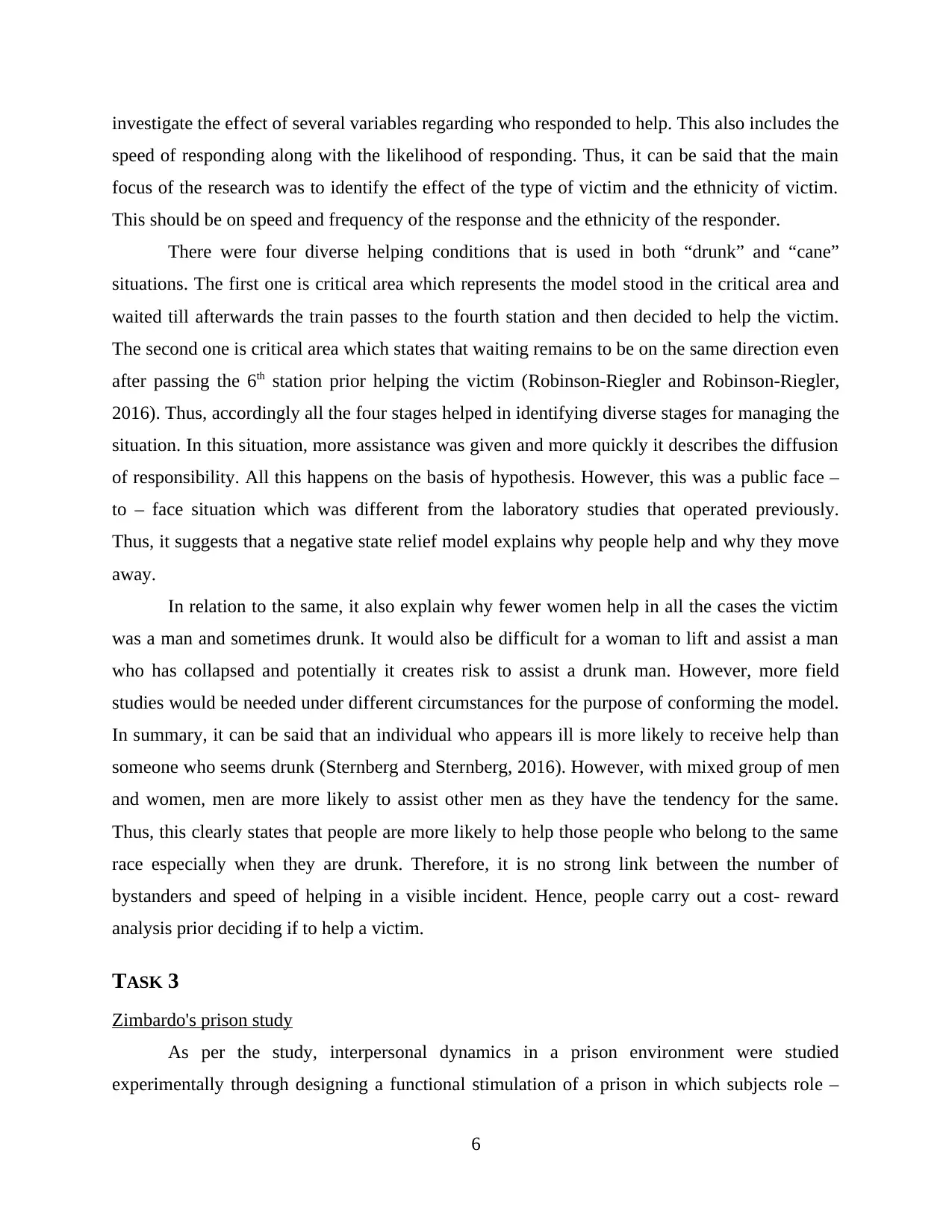
investigate the effect of several variables regarding who responded to help. This also includes the
speed of responding along with the likelihood of responding. Thus, it can be said that the main
focus of the research was to identify the effect of the type of victim and the ethnicity of victim.
This should be on speed and frequency of the response and the ethnicity of the responder.
There were four diverse helping conditions that is used in both “drunk” and “cane”
situations. The first one is critical area which represents the model stood in the critical area and
waited till afterwards the train passes to the fourth station and then decided to help the victim.
The second one is critical area which states that waiting remains to be on the same direction even
after passing the 6th station prior helping the victim (Robinson-Riegler and Robinson-Riegler,
2016). Thus, accordingly all the four stages helped in identifying diverse stages for managing the
situation. In this situation, more assistance was given and more quickly it describes the diffusion
of responsibility. All this happens on the basis of hypothesis. However, this was a public face –
to – face situation which was different from the laboratory studies that operated previously.
Thus, it suggests that a negative state relief model explains why people help and why they move
away.
In relation to the same, it also explain why fewer women help in all the cases the victim
was a man and sometimes drunk. It would also be difficult for a woman to lift and assist a man
who has collapsed and potentially it creates risk to assist a drunk man. However, more field
studies would be needed under different circumstances for the purpose of conforming the model.
In summary, it can be said that an individual who appears ill is more likely to receive help than
someone who seems drunk (Sternberg and Sternberg, 2016). However, with mixed group of men
and women, men are more likely to assist other men as they have the tendency for the same.
Thus, this clearly states that people are more likely to help those people who belong to the same
race especially when they are drunk. Therefore, it is no strong link between the number of
bystanders and speed of helping in a visible incident. Hence, people carry out a cost- reward
analysis prior deciding if to help a victim.
TASK 3
Zimbardo's prison study
As per the study, interpersonal dynamics in a prison environment were studied
experimentally through designing a functional stimulation of a prison in which subjects role –
6
speed of responding along with the likelihood of responding. Thus, it can be said that the main
focus of the research was to identify the effect of the type of victim and the ethnicity of victim.
This should be on speed and frequency of the response and the ethnicity of the responder.
There were four diverse helping conditions that is used in both “drunk” and “cane”
situations. The first one is critical area which represents the model stood in the critical area and
waited till afterwards the train passes to the fourth station and then decided to help the victim.
The second one is critical area which states that waiting remains to be on the same direction even
after passing the 6th station prior helping the victim (Robinson-Riegler and Robinson-Riegler,
2016). Thus, accordingly all the four stages helped in identifying diverse stages for managing the
situation. In this situation, more assistance was given and more quickly it describes the diffusion
of responsibility. All this happens on the basis of hypothesis. However, this was a public face –
to – face situation which was different from the laboratory studies that operated previously.
Thus, it suggests that a negative state relief model explains why people help and why they move
away.
In relation to the same, it also explain why fewer women help in all the cases the victim
was a man and sometimes drunk. It would also be difficult for a woman to lift and assist a man
who has collapsed and potentially it creates risk to assist a drunk man. However, more field
studies would be needed under different circumstances for the purpose of conforming the model.
In summary, it can be said that an individual who appears ill is more likely to receive help than
someone who seems drunk (Sternberg and Sternberg, 2016). However, with mixed group of men
and women, men are more likely to assist other men as they have the tendency for the same.
Thus, this clearly states that people are more likely to help those people who belong to the same
race especially when they are drunk. Therefore, it is no strong link between the number of
bystanders and speed of helping in a visible incident. Hence, people carry out a cost- reward
analysis prior deciding if to help a victim.
TASK 3
Zimbardo's prison study
As per the study, interpersonal dynamics in a prison environment were studied
experimentally through designing a functional stimulation of a prison in which subjects role –
6
⊘ This is a preview!⊘
Do you want full access?
Subscribe today to unlock all pages.

Trusted by 1+ million students worldwide
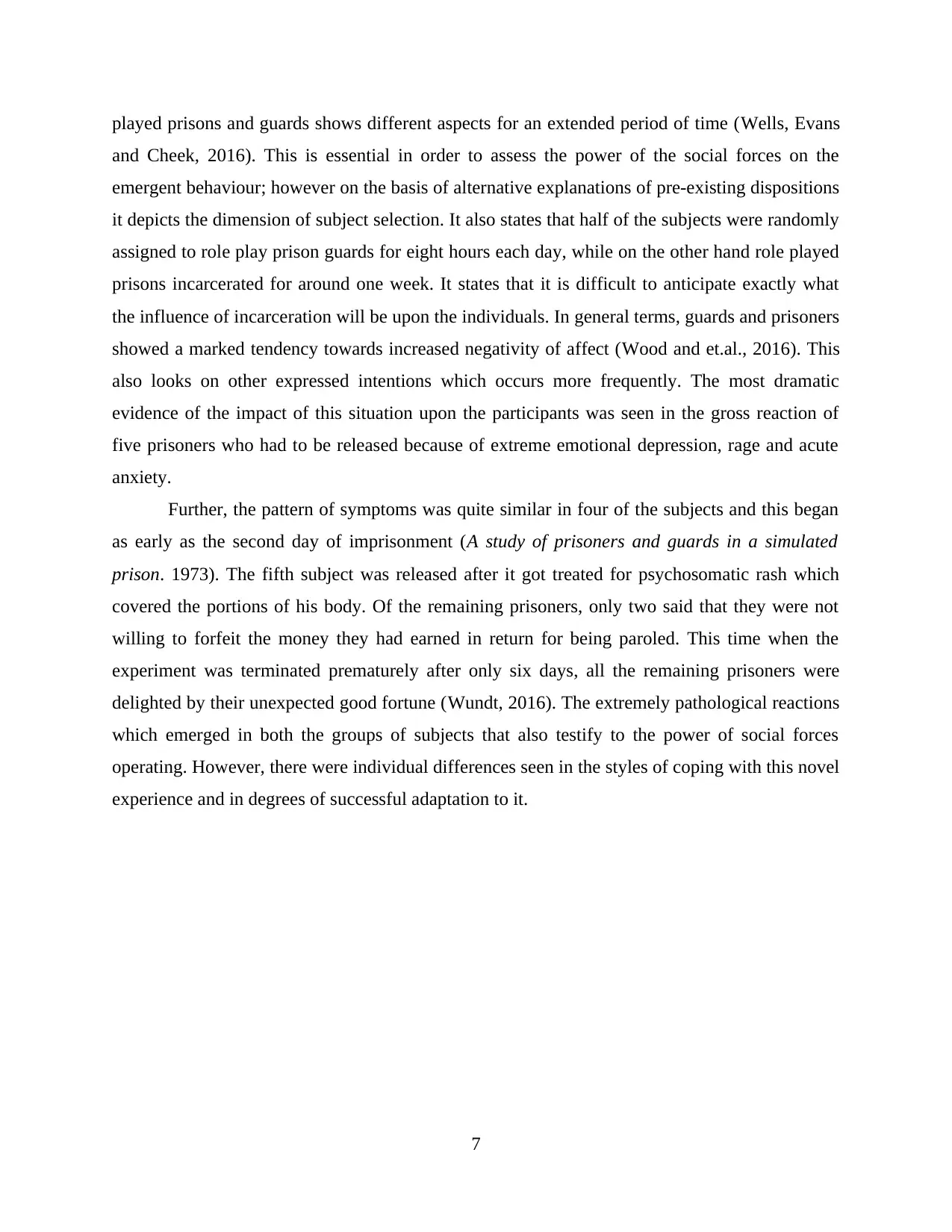
played prisons and guards shows different aspects for an extended period of time (Wells, Evans
and Cheek, 2016). This is essential in order to assess the power of the social forces on the
emergent behaviour; however on the basis of alternative explanations of pre-existing dispositions
it depicts the dimension of subject selection. It also states that half of the subjects were randomly
assigned to role play prison guards for eight hours each day, while on the other hand role played
prisons incarcerated for around one week. It states that it is difficult to anticipate exactly what
the influence of incarceration will be upon the individuals. In general terms, guards and prisoners
showed a marked tendency towards increased negativity of affect (Wood and et.al., 2016). This
also looks on other expressed intentions which occurs more frequently. The most dramatic
evidence of the impact of this situation upon the participants was seen in the gross reaction of
five prisoners who had to be released because of extreme emotional depression, rage and acute
anxiety.
Further, the pattern of symptoms was quite similar in four of the subjects and this began
as early as the second day of imprisonment (A study of prisoners and guards in a simulated
prison. 1973). The fifth subject was released after it got treated for psychosomatic rash which
covered the portions of his body. Of the remaining prisoners, only two said that they were not
willing to forfeit the money they had earned in return for being paroled. This time when the
experiment was terminated prematurely after only six days, all the remaining prisoners were
delighted by their unexpected good fortune (Wundt, 2016). The extremely pathological reactions
which emerged in both the groups of subjects that also testify to the power of social forces
operating. However, there were individual differences seen in the styles of coping with this novel
experience and in degrees of successful adaptation to it.
7
and Cheek, 2016). This is essential in order to assess the power of the social forces on the
emergent behaviour; however on the basis of alternative explanations of pre-existing dispositions
it depicts the dimension of subject selection. It also states that half of the subjects were randomly
assigned to role play prison guards for eight hours each day, while on the other hand role played
prisons incarcerated for around one week. It states that it is difficult to anticipate exactly what
the influence of incarceration will be upon the individuals. In general terms, guards and prisoners
showed a marked tendency towards increased negativity of affect (Wood and et.al., 2016). This
also looks on other expressed intentions which occurs more frequently. The most dramatic
evidence of the impact of this situation upon the participants was seen in the gross reaction of
five prisoners who had to be released because of extreme emotional depression, rage and acute
anxiety.
Further, the pattern of symptoms was quite similar in four of the subjects and this began
as early as the second day of imprisonment (A study of prisoners and guards in a simulated
prison. 1973). The fifth subject was released after it got treated for psychosomatic rash which
covered the portions of his body. Of the remaining prisoners, only two said that they were not
willing to forfeit the money they had earned in return for being paroled. This time when the
experiment was terminated prematurely after only six days, all the remaining prisoners were
delighted by their unexpected good fortune (Wundt, 2016). The extremely pathological reactions
which emerged in both the groups of subjects that also testify to the power of social forces
operating. However, there were individual differences seen in the styles of coping with this novel
experience and in degrees of successful adaptation to it.
7
Paraphrase This Document
Need a fresh take? Get an instant paraphrase of this document with our AI Paraphraser
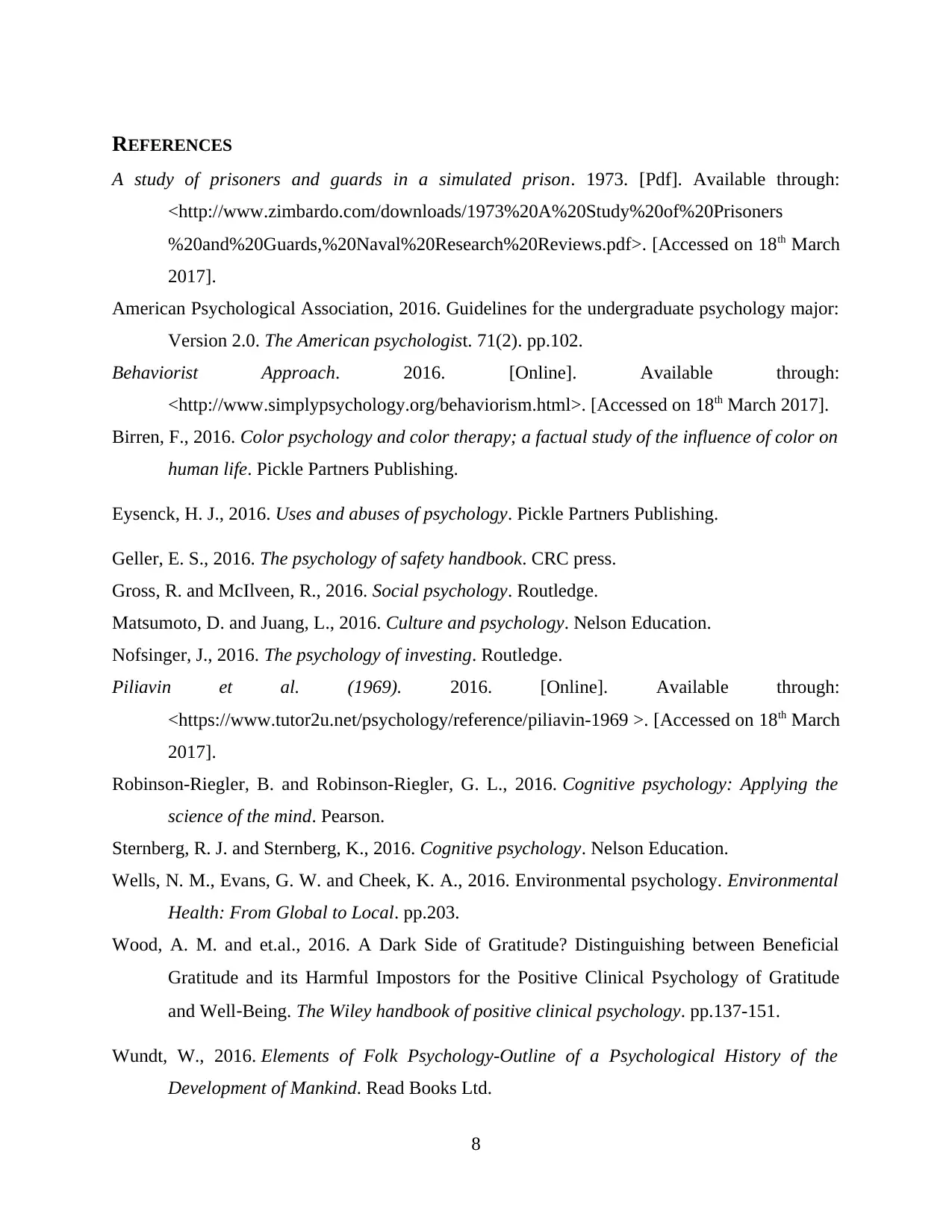
REFERENCES
A study of prisoners and guards in a simulated prison. 1973. [Pdf]. Available through:
<http://www.zimbardo.com/downloads/1973%20A%20Study%20of%20Prisoners
%20and%20Guards,%20Naval%20Research%20Reviews.pdf>. [Accessed on 18th March
2017].
American Psychological Association, 2016. Guidelines for the undergraduate psychology major:
Version 2.0. The American psychologist. 71(2). pp.102.
Behaviorist Approach. 2016. [Online]. Available through:
<http://www.simplypsychology.org/behaviorism.html>. [Accessed on 18th March 2017].
Birren, F., 2016. Color psychology and color therapy; a factual study of the influence of color on
human life. Pickle Partners Publishing.
Eysenck, H. J., 2016. Uses and abuses of psychology. Pickle Partners Publishing.
Geller, E. S., 2016. The psychology of safety handbook. CRC press.
Gross, R. and McIlveen, R., 2016. Social psychology. Routledge.
Matsumoto, D. and Juang, L., 2016. Culture and psychology. Nelson Education.
Nofsinger, J., 2016. The psychology of investing. Routledge.
Piliavin et al. (1969). 2016. [Online]. Available through:
<https://www.tutor2u.net/psychology/reference/piliavin-1969 >. [Accessed on 18th March
2017].
Robinson-Riegler, B. and Robinson-Riegler, G. L., 2016. Cognitive psychology: Applying the
science of the mind. Pearson.
Sternberg, R. J. and Sternberg, K., 2016. Cognitive psychology. Nelson Education.
Wells, N. M., Evans, G. W. and Cheek, K. A., 2016. Environmental psychology. Environmental
Health: From Global to Local. pp.203.
Wood, A. M. and et.al., 2016. A Dark Side of Gratitude? Distinguishing between Beneficial
Gratitude and its Harmful Impostors for the Positive Clinical Psychology of Gratitude
and Well‐Being. The Wiley handbook of positive clinical psychology. pp.137-151.
Wundt, W., 2016. Elements of Folk Psychology-Outline of a Psychological History of the
Development of Mankind. Read Books Ltd.
8
A study of prisoners and guards in a simulated prison. 1973. [Pdf]. Available through:
<http://www.zimbardo.com/downloads/1973%20A%20Study%20of%20Prisoners
%20and%20Guards,%20Naval%20Research%20Reviews.pdf>. [Accessed on 18th March
2017].
American Psychological Association, 2016. Guidelines for the undergraduate psychology major:
Version 2.0. The American psychologist. 71(2). pp.102.
Behaviorist Approach. 2016. [Online]. Available through:
<http://www.simplypsychology.org/behaviorism.html>. [Accessed on 18th March 2017].
Birren, F., 2016. Color psychology and color therapy; a factual study of the influence of color on
human life. Pickle Partners Publishing.
Eysenck, H. J., 2016. Uses and abuses of psychology. Pickle Partners Publishing.
Geller, E. S., 2016. The psychology of safety handbook. CRC press.
Gross, R. and McIlveen, R., 2016. Social psychology. Routledge.
Matsumoto, D. and Juang, L., 2016. Culture and psychology. Nelson Education.
Nofsinger, J., 2016. The psychology of investing. Routledge.
Piliavin et al. (1969). 2016. [Online]. Available through:
<https://www.tutor2u.net/psychology/reference/piliavin-1969 >. [Accessed on 18th March
2017].
Robinson-Riegler, B. and Robinson-Riegler, G. L., 2016. Cognitive psychology: Applying the
science of the mind. Pearson.
Sternberg, R. J. and Sternberg, K., 2016. Cognitive psychology. Nelson Education.
Wells, N. M., Evans, G. W. and Cheek, K. A., 2016. Environmental psychology. Environmental
Health: From Global to Local. pp.203.
Wood, A. M. and et.al., 2016. A Dark Side of Gratitude? Distinguishing between Beneficial
Gratitude and its Harmful Impostors for the Positive Clinical Psychology of Gratitude
and Well‐Being. The Wiley handbook of positive clinical psychology. pp.137-151.
Wundt, W., 2016. Elements of Folk Psychology-Outline of a Psychological History of the
Development of Mankind. Read Books Ltd.
8
1 out of 8
Related Documents
Your All-in-One AI-Powered Toolkit for Academic Success.
+13062052269
info@desklib.com
Available 24*7 on WhatsApp / Email
![[object Object]](/_next/static/media/star-bottom.7253800d.svg)
Unlock your academic potential
Copyright © 2020–2026 A2Z Services. All Rights Reserved. Developed and managed by ZUCOL.





